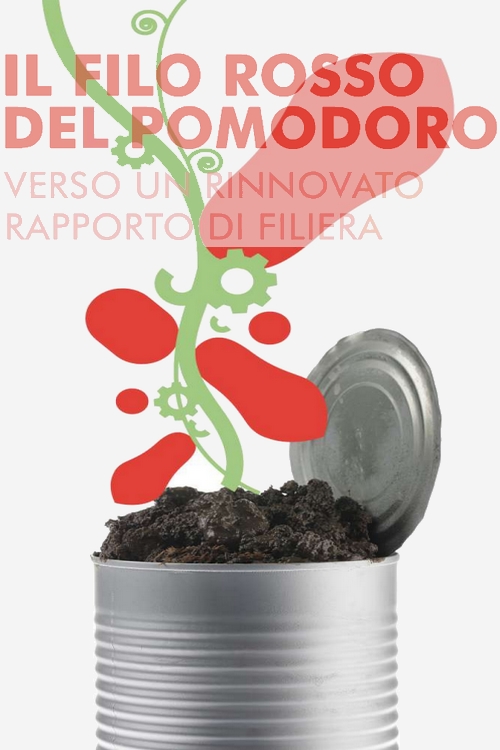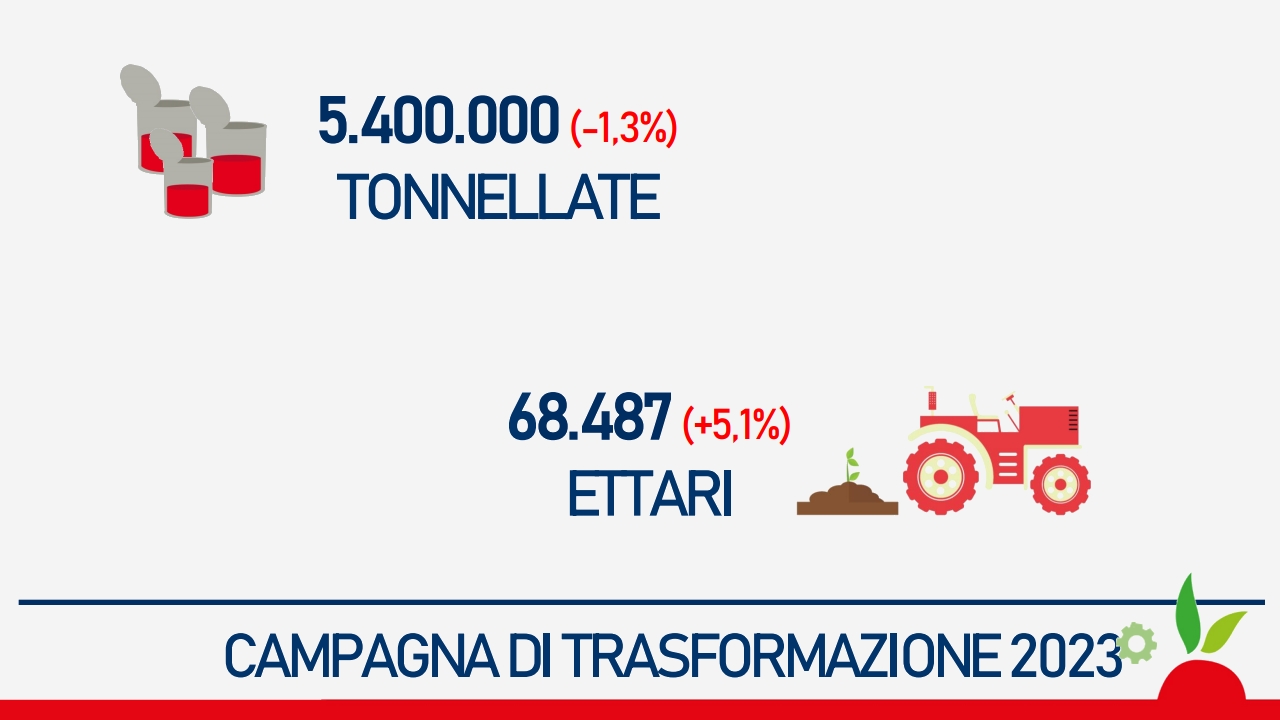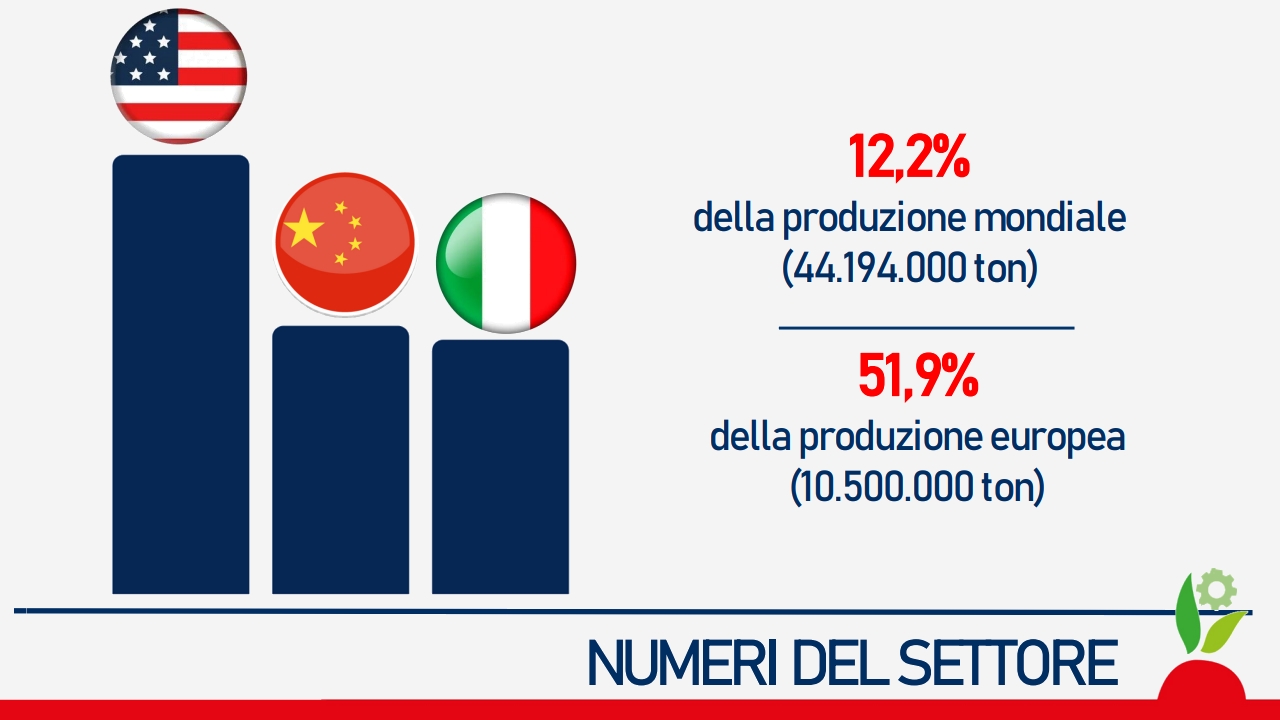The ANICAV Annual General Meeting was an opportunity to present a CREA study analyzing the structural differences between the northern and south-central regions.
For the ANICAV, "a community of objectives is needed to protect the entire tomato industry. It will be essential to invest in order to optimize agricultural production."
President Serafini believes that "only a coherent industry can guarantee the long-term survival and competitiveness of the entire system. Otherwise, we risk losing a significant market share." Anicav Managing Director Giovanni De Angelis added: "We're not looking for anyone to blame, but for solutions that benefit everyone. We need to promote research and experimentation so as to reduce production costs for agricultural operators, improve yields and identify the varieties that are best suited to processing."
Lower production costs in the northern region and higher average farm yields in the southern area, in addition to obvious structural differences in terms of farm sizes and soil characteristics: these are the findings of an economic analysis of the processing tomato production setup carried out by the CREA (Council for Agricultural Research and Analysis of the Agrarian Economy), Italy's leading research organization dedicated to the agri-food sectors and supervised by the Ministry of Agriculture, Food Sovereignty and Forestry (Masaf), on behalf of the ANICAV.
 This detailed analysis provided the insights needed to stimulate debate at the annual public meeting, Il Filo Rosso del Pomodoro, organized by the National Association of Plant-based Food Canning Operators, held on November 24, 2023, in Naples. The main protagonists from the world of industry, cooperation and agriculture discussed the results of the study and the possible solutions to be implemented in order to protect and enhance the processing tomato sector, one of the flagships of the Made-in-Italy agri-food sector.
This detailed analysis provided the insights needed to stimulate debate at the annual public meeting, Il Filo Rosso del Pomodoro, organized by the National Association of Plant-based Food Canning Operators, held on November 24, 2023, in Naples. The main protagonists from the world of industry, cooperation and agriculture discussed the results of the study and the possible solutions to be implemented in order to protect and enhance the processing tomato sector, one of the flagships of the Made-in-Italy agri-food sector.
"The socioeconomic context in which we live and work is particularly difficult, and it is more necessary than ever to develop a common vision," declared ANICAV President Marco Serafini. "Only a coherent and efficient industry can guarantee the conditions of survival and competitiveness of the whole system in the long term. We now find ourselves in an increasingly globalized context: the specificity that has always set us apart from our international competitors is no longer enough to protect our products, so we need an industry-wide dialogue that can support our productions and make them competitive on the markets. We need to combine the efforts of those who grow and those who process to create value throughout the industry."
ANICAV Managing Director Giovanni De Angelis continued: "We need a renewed relationship within the industry, in everyone's interest. Crea's study puts forward some interesting ideas from which we can begin to think together about how to improve the system. Through constructive discussion with professional agricultural organizations and their representatives, we need to find a way to act according to market logic, plan ahead, make contracts more effective, encourage aggregation and, above all, promote research and experimentation in order to reduce farm production costs, improve yields and identify the varieties that are best suited to processing. In our opinion, this is the way forward.
"We're not looking for anyone to blame, but for solutions that will enable us to overcome critical problems together!"
The study in brief
The study analyzed in detail the economic aspects related to processing tomato production in the two production districts (North and South), through the use of ISTAT data, questionnaires and interviews with stakeholders, and through information available in the R.I.C.A. database (Agricultural Accounting Information Network). More specifically, the analysis of the sample's structural characteristics and production costs focused on a total of 552 companies that grew tomatoes in the two production districts over the three-year period 2019-2021.
The first differences between the two production regions concern economic considerations. In the northern region, 95% of tomato companies are large and medium-sized (with sales ranging from EUR 100,000 to over 500,000), while in the southern region, this percentage falls to 64%. As far as ownership of cultivated areas is concerned, rental prevails in almost 60% of cases in the northern region. Conversely, in the south, ownership is predominant (almost 50% versus 44% rental). There are also differences in terms of production volumes: in the northern district, there is a fairly even distribution between the different production classes, from less than 500 tonnes (t) to over 3,000 tonnes of products. In the southern region, growers producing less than 500 tonnes of products clearly predominate (over 65%).

There are also significant differences in terms of yield and production costs. On average, yields in the southern region are significantly higher than in the northern region: 87.8 t/ha in the south versus 69.6 t/ha in the north. In addition, yields are fairly uniform in the north, while there is considerable variability in the south. This is a clear sign that a process of standardization of production models is underway in the former, while a high degree of diversity remains in the latter.
As regards the breakdown of production costs, the picture is fairly balanced, with the various items and inputs costing approximately the same amount in the final invoice. The greatest impact is on labor costs (27% in the north and 29% in the south), mechanical harvesting costs (14% in the north and 17% in the south) and seed purchases (14% in the north and 15% in the south).
Over and above the impact of costs, what deserves particular attention is the difference in certain cost items, which are much higher in the south than in the north. In the southern district, the cost of purchasing seeds and seedlings is 48% higher than in the north, while the cost of purchasing and using agrochemical inputs for crop protection is 59% higher. It should also be noted that the cost of water resources is 71% higher. In the south, costs linked to mechanical harvesting are higher (+68%) due to more frequent use of service providers, as are labor costs (+58%) linked to the large number of personnel required for harvesting into bins.
In conclusion, it is clear from the analysis that farm businesses in the southern region, due to their small physical and economic sizes, are unable to achieve economies of scale and, consequently, find it more difficult to influence some of the main cost items. At the same time, average yields per cultivated hectare in the southern areas are significantly higher than in the northern areas.

The industry in figures
The processing tomato sector is Italy's largest processed fruit and vegetable sector. With total sales (2022) of EUR 4.4 billion (3.3 billion generated by companies associated with the ANICAV), the industry plays a strategic role as a driving force in the national economy, employing around 10,000 permanent staff and over 25,000 seasonal workers, in addition to the workforce involved in related industries.
Italy is the world's third-largest tomato processor after the United States and China, and it remains the leading processor of products intended directly for final consumption, accounting for 12.2% of worldwide production (44.2 million tonnes in 2023) and 53% of European processing operations.
The ANICAV
The ANICAV (National Association of plant-based food canners), founded in Naples on February 5, 1945, is the largest representative association of tomato processing companies in the world in terms of the number of member companies and quantity of products processed. It includes 3/4 of the processing industries operating in Italy, which deal with around 70% of all the processed tomatoes in the country and almost all whole-peeled tomatoes produced worldwide, with sales of EUR 3.3 billion in 2022 (accounting for 75% of the total sales of the Italian tomato processing sector). Approximately 60% of this production is destined for export to Europe (Germany, France, UK) and other countries (USA, Japan, Australia), making tomatoes an ambassador of Made-in-Italy excellence worldwide.
Some complementary data
Now in its eleventh year, the "tomato red thread" (Filo Rosso del Pomodoro) has been an important opportunity for the various players in the tomato supply chain to meet and exchange views on issues of the utmost interest to the industry.
The 2023 edition took place on November 24 in Naples, at the Stazione Marittima. All public documents are available by clicking here.
The Report presented by ANICAV President Marco Serafini at the "Red Thread" Il Filo Rosso del Pomodoro 2023 Public Meeting is available by clicking here.
Figures and comments regarding the 2023 campaign are set out in a document available by clicking here.
Sources: ANCAV Press Release, corriereortofrutticolo.it



































